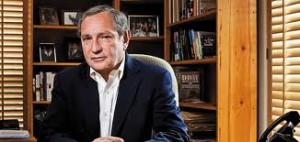George Friedman, CEO of Stratfor, a global intelligence company, came to SXSW Interactive to speak about surviving technology. However, an Occupy “mic check” broke out over Stratfor’s alleged involvement in spying and trying to bring down the Occupy Movement. The alleged involvement stems from the December hacking of Stratfor, where customers’ credit cards were charged and emails were released via WikiLeaks. Following the removal of protesters, Friedman defended Stratfor and denied spying. Watch the video for the protest and the beginning of Friedman’s speech in which he explains how the hack unfolded and its effect on everyone involved.
A key point Friedman made following the “mic check” was that he will not let others define what he speaks about. The main emphasis of his speech, especially the first 30 minutes, was that Stratfor did nothing wrong. He even urged the audience to go to WikiLeaks to see the internal emails. Friedman then made a point to justify what is in the emails, including speaking about the “orgy of speculation” that he and his employees undertook following Osama bin Laden’s death. Friedman made the point that people are treating these internal emails as if they were official documents. He spoke about a joke book that Stratfor employees created, that following the leaks, has been treated as if it were a secret manual of Stratfor.
Basically, he emphasized that Stratfor has nothing to hide and referred to the hack and the resulting scrutiny as a “process of falsification and dehumanization.”

Finally, Friedman began to discuss the topic of his speech “Surviving Technology” and its relation to the hack. “The growth and reproduction of technology falsifies many things, particularly relationships.” He emphasized that the Internet has created bad substitutions for human contact. Friedman pointed his finger at Twitter, and that with this platform, the quality of conversation is profoundly limited.
Friedman drove home his point that most thoughts we share are in absolute privacy and what if your private dinner with your husband or wife was shared with everyone? He brought this point back to the hack and how most emails we write are not entirely thought-out and some we never want to share with anyone. He asked the audience, “What if someone chose 10 emails out of the hundreds you have written and shared those 10 with everyone? What might that look like?” The first hacked email that was released was one that an employee sent to his son’s physician. According to Friedman, the email was a “work of agony” as the employee wrote that his son’s medication wasn’t working. Apparently, the hacker’s response to this email was, “I almost pissed myself, this is so funny.” Friedman stated that he can forgive the hackers for trying to bring down Stratfor but he will never forgive them for that.
Friedman emphasized that privacy is critical in this age of technology and social media, and lifting emails out of context creates lies and falsifications.
Friedman then spoke about the preposterous notions from the hackers that the world is better and safer now that these documents have been released. He used this to criticize both the media and WikiLeaks. Friedman feels that supporters of WikiLeaks believe that diplomacy is better than war, which he agrees with, but in order for there to be diplomacy, there must be secrecy. Friedman feels that war is more likely when confidential information is released, because it ruins relationships. According to Friedman, WikiLeaks creates a sense of insecurity.
Friedman believes that the Internet is a good thing, but in the wrong hands, it becomes a dangerous tool. He referred to the hackers as “muggers” and that the Internet is the “commons in which we live and it cannot be secured.” He values anonymity of the Internet, but at the same time he feels it facilitates criminal behavior. “The Internet can make people do and say things that they wouldn’t in person.” He never again will feel comfortable making a joke online or sitting down to type at a keyboard. While Stratfor has rebuilt the servers from scratch, there is always the possibility that a hack can occur again do to the one percent of people who are capable of breaking into the system. He believes that, in this day and age, there are two types of companies: those who have been hacked and those waiting to be hacked.
Friedman ended his speech by discussing the impact hackers will have on the freedom of the Internet. Essentially, he feels that suppression of the Internet will occur because of hackers. He believes in net neutrality, but in order for the Internet to be free, Friedman feels we must have rules of civility in our everyday lives. He implores the tech crowd to think of technology that allows anonymity but holds people accountable for their actions online. Friedman ended with the prophetic statement that, “toleration of abuse will create a world in which the Internet will not survive.”
